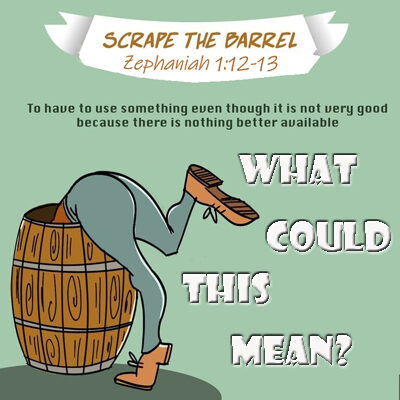Scraping the Bottom of the Barrel
There is an idiom that goes: “To scrape the bottom of the barrel”. (Cambridge Dictionary) The idiom means “to use the worst people or things because that is all that is available:” According to Wikipedia, this idiom “Derived from the historical practice in the early European history of storing food in barrels; when food supplies ran low, only what was on the very bottom of the barrel remained, and had to be removed by scraping.” Alex Epstein in his 2014 book, “The Moral Case for Fossil Fuels” Stated the expression “scraping the bottom of the barrel” comes from the phenomenon of the oil in a barrel existing in different fractions, from heavy to light. The heavy fractions sit at the bottom of the barrel, and the heaviest, like asphaltum, which goes into asphalt, can be hard to scrape out and impossible to use.
Believe it or not—this is a bible term and was used by Zephaniah – let’s read it here: “12 “And it shall come to pass at that time that I will search Jerusalem with lamps, and punish the men who are settled[a] in complacency, Who say in their heart, the Lord will not do good, nor will He do evil.’ 13 Therefore their goods shall become booty, and their houses a desolation; They shall build houses, but not inhabit them; They shall plant vineyards, but not drink their wine.” (Zephaniah 1:12-13).
Can you guess which word captures the Idiom Scrap the Barrel. Notice the word used here, “Settled” — that is it. Strong’s says it a primitive root; MEANING to shrink, i.e. Thicken (as unracked wine, curdled milk, clouded sky, frozen water) — congeal, curdle, dark, settle. The KJV sheds a little more light on this: “And it shall come to pass at that time, that I will search Jerusalem with candles, and punish the men that are settled on their lees: that say in their heart, The LORD will not do good, neither will he do evil.” (Zeph. 1:12).
Lees or dregs are used here by translators refer to the lees (dregs, sediments) of wine or other liquids that settle in the bottom of the containing vessel if it is not disturbed. Hence, the idiom refers to someone or something that is at ease, not disturbed, or worried.
Connecting all the dots we see that God speaking through the prophet is proclaiming judgment on them for their being so settled in, and it’s not looking good. God will deliver up Jerusalem into the hands of the Chaldeans, who shall let no corner of it escape them, but shall diligently search the houses, even with lights or torches, that they may plunder them of every thing and punish the men that are settled on their lees — that is to say those who live securely in ease and plenty: Similarly, Amos speaks Warnings to Zion and Samaria saying: “Woe to you who are at ease in Zion, and trust in Mount Samaria, notable persons in the chief nation, to whom the house of Israel comes!” (Amos 6:1).
What then does this mean to Israel and then to the church? Listen in and we’ll see together.
